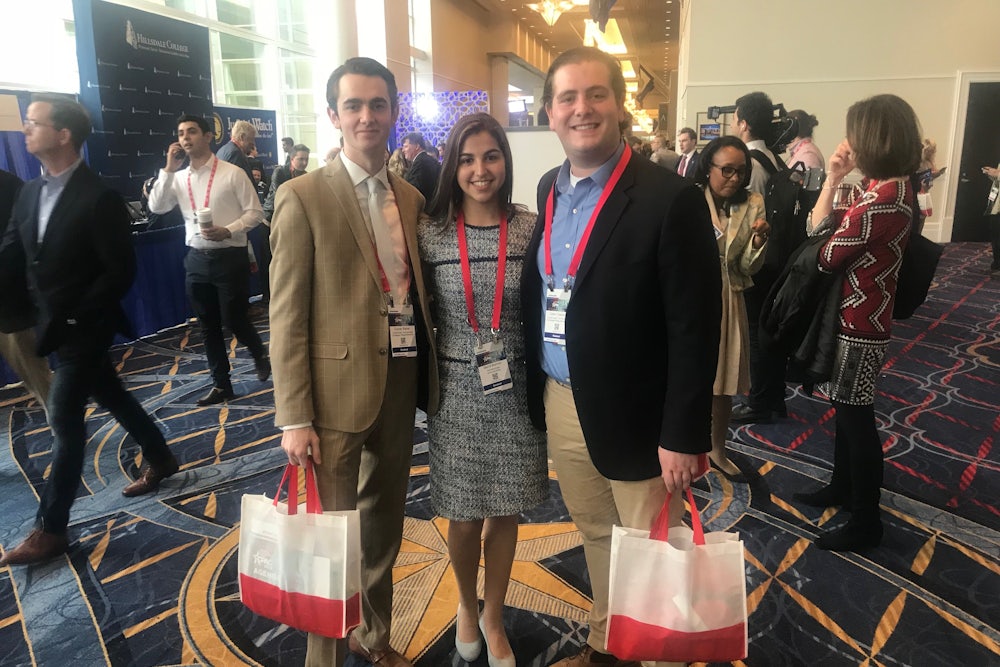“I think we could use more gun control,” said Callen Creeden, a 19-year-old sophomore at American University, at the annual Conservative Political Action Conference on Thursday. “That doesn’t mean we take away guns,” he added, and began listing reforms he would support, like stricter background checks.
Creeden was the fourth teenager in a row at CPAC to tell me they’d be willing to strengthen federal gun laws in the wake of last week’s shooting rampage at Marjory Stoneman Douglas High School in Parkland, Florida—a stark contrast to the event’s official speakers and many other CPAC attendees.
Earlier in the day, on the main event stage, National Rifle Association spokesperson Dana Loesch asserted that guns had “nothing to do with” the Parkland shooting that left 17 people dead. She pinned the tragedy on the FBI’s failure to follow up on reports about the shooter. NRA head Wayne LaPierre took a similar tack in his own speech. “What they want are more restrictions on the law-abiding,” he said. “Their solution is to make you, all of you, less free. They want to sweep right under the carpet the failure of school security, the failure of family, the failure of America’s mental health system. And even the unbelievable failure of the FBI.”
LaPierre didn’t say it, but the most prominent “they” in this case are teenagers—the the survivors of the Parkland shooting who have become fierce advocates for gun control. These students have been smeared with conspiracy theories that they’re paid actors, and been accused of being fed talking points. Others on the right simply dismiss the victims as too young and impressionable to understand policy or politics. But young people also make up a significant percentage of CPAC attendees: 47 percent are between 18 and 24 years old. (College students arrive by the busload.)
Naturally, these attendees were less likely to dismiss the Parkland victims because of their age. “Those kids are very emotional, but that doesn’t make their opinion any less valuable,” said Gunner Ramer, a 19-year-old sophomore at American University. “We’re trying to solve such a complex issue—wouldn’t you want to cast the widest net possible?” Ian Baucke, a 19-year-old at George Washington University, said arguments should be based on merit only. “I’m not a big fan of identity politics, and age is part of that,” he said. “There are plenty of old people with bad opinions.” Creeden said he felt age-based dismissals of Parkland victims were hypocritical, especially coming from conservative leaders like Senator Ted Cruz, who gushed over “young people” at his CPAC event. “It’s gross to say that the youth are the future, and then put down our opinions when they’re against anything they’re saying,” he said.
Their willingness to listen to the Parkland victims, however, didn’t translate into agreement with their proposed policies. In the wake of the massacre, some students have called for a ban on certain types of assault-style rifles; pressured politicians to refuse money from the NRA; and pleaded with President Donald Trump to increase school safety measures. The idea of outright weapons bans and vilifying the NRA do not tend to go over well with CPAC teens. “I’m a big Second Amendment supporter,” Baucke said. “Your average American should have the ability to buy guns.”
School safety measures, however, are an area of compromise. “I think if this happened in my school, I’d be an even stronger advocate for school security,” said Nicholas Lecatsas, 19, a freshman at Elizabethtown College. His classmate, 20-year-old junior Cameron Dorr, supports armed, trained security guards. (The CPAC teens I spoke to did not agree with Trump and Cruz that teachers should be armed.) “I know school budgets are tight, but we spend much more money on crap,” he said. “I’m sure parents would be willing to pay a little more to keep their kids safe.”
Most of the CPAC teens I spoke to expressed support for other gun control measures Trump called for on Thursday: raising the minimum age for buying a semi-automatic weapon from 18 to 21, expanding background checks with an emphasis on mental health, and banning the sale of “bump stocks,” which effectively convert semiautomatic rifles into machine guns.
I will be strongly pushing Comprehensive Background Checks with an emphasis on Mental Health. Raise age to 21 and end sale of Bump Stocks! Congress is in a mood to finally do something on this issue - I hope!
— Donald J. Trump (@realDonaldTrump) February 22, 2018
“Those proposals reflect our Second Amendment rights for law-abiding citizens to own guns,” said 19-year-old American University student Merrill Brenner, to nods from her classmates. But Dorr and Lecatsas were more skeptical of Trump’s proposals. If you can vote at 18, they said, then you should be able access the full suite of legal weaponry. A bump stock ban doesn’t make sense, they said, because bump stocks can be replicated with a 3-D printer. As for mental-health background checks, Dorr said, “At the end of the day, knives exist, cars exist, there are plenty of things in this world you can use to kill others. If you are a healthy adult male you can kill another person. But the reason we don’t is because we have values.”
In other words, Dorr and Lecatsas did not appear willing to make a compromise, which Dorr acknowledged was problematic. “I do think that the gun debate has really just become more of a debate than trying to solve a problem,” he said. That fact was reflected elsewhere at CPAC, where other attendees said they legitimately believed the Parkland shooting victims were paid actors, and NRA paraphernalia covered walls and booths. Whether they’re the future of the conservative movement, or teens like Creeden and Ramer are, will determine just how arduous a fight the Parkland victims have ahead of them.
